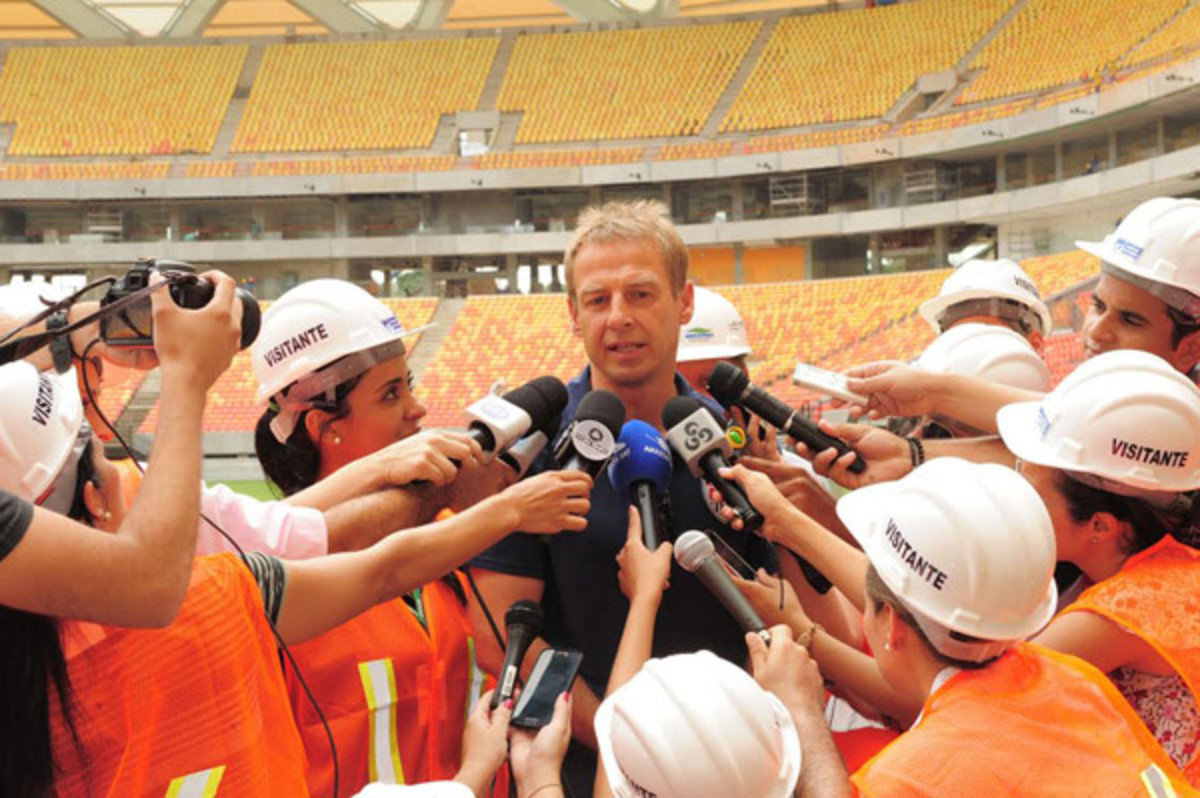
Jurgen Klinsmann embraces Manaus experience after initial dismay
U.S. national team manager Jurgen Klinsmann attracted quite the crowd during his visit to Manaus, Brazil. (Photo courtesy of USSoccer.com)
CARSON, Calif. – For Jurgen Klinsmann, familiarity breeds contentment, not contempt.
Prior to December’s World Cup draw, the U.S. national team coach said, “Everyone wants to avoid Manaus,” the remote, sweltering Amazon city of around 2 million people that will host four matches at next summer’s tournament.
“It’s an unlucky decision to have a location like that in a World Cup, because of the [lengthy] flight, because of the [weather] circumstances there. I think it shouldn’t have been a location for the World Cup,” he said.
Klinsmann wasn’t alone. England coach Roy Hodgson called Manaus “the place ideally to avoid” and “a difficult venue for everyone.” That angered mayor Arthur Virgilio, who said, "We would also prefer that England doesn't come. We hope to get a better team and a coach who is more sensible and polite. He's one of the few people in the world who is not curious about the Amazon, who doesn't want to know about Manaus."
Naturally, both England and the U.S. wound up in Manaus, where the Americans will face Portugal on July 22 in the second game of their Group of Death gauntlet. Following the draw, Klinsmann said, “Well, it couldn’t have gone any more difficult.”
But Klinsmann also is as curious as they come, so not only did he pay a visit to Manaus this month, he dined with the mayor. Speaking to the press on Monday as the U.S. trained here at StubHub Center, the U.S. coach expressed his evolving views, and a little excitement, when asked about his team’s impending Amazon adventure.
“Before a draw you say, ‘OK, if I could avoid that flight there and playing under those conditions, it would be nice.’ But once the draw was done there was no complaining anymore from our end, because both teams will play under the same circumstances,” Klinsmann said.
It could be argued that the lengthy flights and conditions might even benefit U.S. players accustomed to the cross-country flights and summer matches that are part and parcel of life in MLS.
“It’s going to be a little hotter than in other places [average highs approach 90 degrees and the humidity hovers around 80 percent]. The place itself is absolutely gorgeous. To be once in Manaus is an experience. I want the players to take it all in. This is something unique. The people there are extremely excited. They are so excited to host World Cup games. It’s a different face of Brazil. That’s what a World Cup is about, to see the different faces of a country, and Manaus is one of those different faces and I’m really looking forward to it,” said Klinsmann, who frequently takes his players to historical and cultural sights while on the road.
CREDITOR: Klinsmann trims U.S. camp roster, but adds Parkhurst
“They have still some challenges in other cities as well with the training sites or with hotels or whatever, but again, that’s what we have to adjust to, whatever we find there,” he continued. “Overall, it’s been very helpful, that you go there and you meet the people and you talk to them. I was invited by the mayor for a nice lunch – awesome guy, an athlete, just came from knee surgery. It’s good to feel that energy and that excitement and the people there and they all appreciate it very much that we were so early there that we had that opportunity to come down there and test things out. Everybody’s ready there for the World Cup.”
Klinsmann visited Manaus while the U.S. was training in São Paulo during the first portion of this critical January camp. It’s important not only because it could impact the World Cup future of several players, but because it gave the manager and his staff the opportunity to acquaint themselves with their home base and group-stage venues months before the tournament.
Manaus, Natal (where the U.S. will open against Ghana) and Recife (the site of the Germany game) no longer are just dots on a map. They’re places with which the U.S. now is familiar and, at least in Manaus, might even receive a warm welcome.
“It was really, really helpful these two weeks, for the team but also for everybody involved form U.S. Soccer too, to experience our team base hotel in São Paulo, to train at the São Paulo FC facility, to meet the people, to get around the city, to get a real sense for it,” Klinsmann said.





